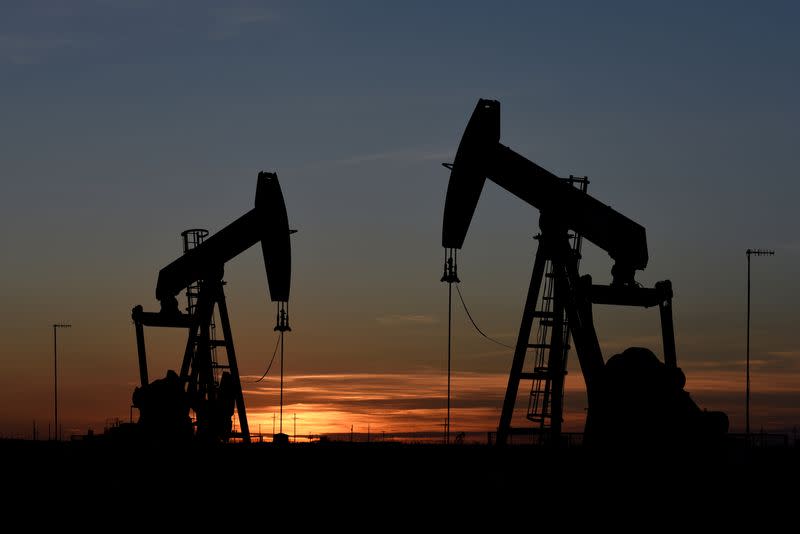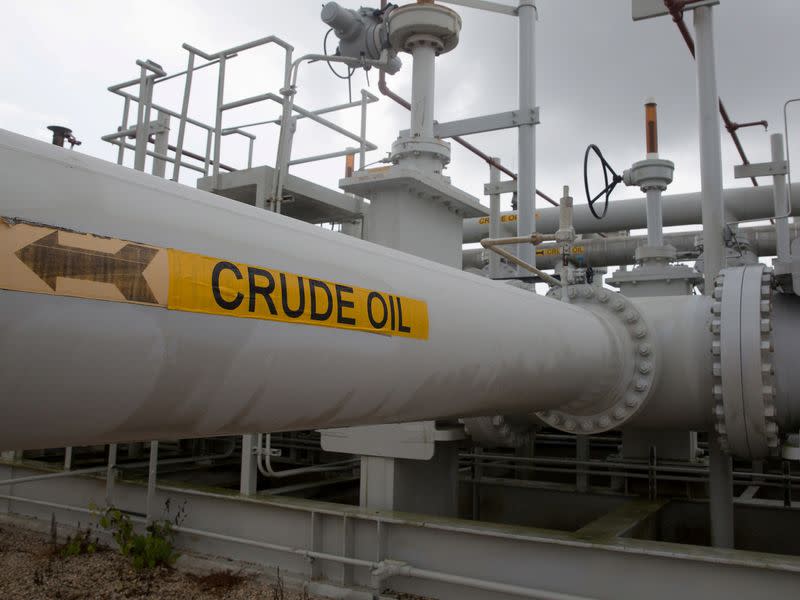Another plunge takes crude benchmarks to lowest levels since 2002
By Scott DiSavino
NEW YORK (Reuters) - Global oil benchmark Brent crude plunged to its cheapest level in almost 18 years on Monday and U.S. crude briefly tumbled below $20 a barrel as investors faced the growing prospect that the global coronavirus shutdown could last for months, further squeezing demand for fuel.
The pandemic is expected to cause at least a 20% drop in fuel demand worldwide as governments take steps to restrict the spread of the virus. With Saudi Arabia and Russia set to flood the market with oil next month, producers and shippers have also been scrambling to lock oil up in storage as demand falls.
Brent <LCOc1> futures fell $2.17, or 8.7%, to settle at $22.76 a barrel, the lowest close since November 2002, while U.S. West Texas Intermediate (WTI) crude <CLc1> fell $1.42, or 6.6%, to $20.09, the lowest close since February 2002.
Global commodities trader Trafigura said oil demand could fall by more than 30 million barrels per day (bpd) in April, nearly one-third of daily fuel consumption.
The price war between Saudi Arabia and Russia erupted earlier this month after the collapse of a three-year deal to limit supply between the Organization of the Petroleum Exporting Countries (OPEC) and other producers led by Moscow.
So far, negotiations between the two producers and the United States have not changed the outlook. Saudi Arabia said on Monday it planned to boost oil exports to 10.6 million barrels per day (bpd) from May.
Major crude benchmarks have recorded losses for five straight weeks. The price of oil is now so low that it is becoming unprofitable for many oil firms to remain active, analysts said, and higher-cost producers will have no choice but to shut production, especially since storage capacity is almost full.
Texas shale producers, Pioneer Natural Resources and Parsley Energy formally asked Texas regulators on Monday to curtail oil production for the first time in nearly 50 years.
Declining demand and swiftly filling storage have squeezed prices for major U.S. grades of crude - some to around $11 a barrel. [CRU/C]
"It appears that the Saudis are on a mission to drive marginal U.S. producers off of the playing field in re-capturing market share," said Jim Ritterbusch, president of Ritterbusch and Associates in Galena, Illinois.
U.S. President Donald Trump and Russian President Vladimir Putin agreed during a phone call to have their top energy officials meet to discuss slumping global oil markets.
The market added to earlier losses after traders said Genscape reported that U.S. stockpiles at the key Cushing storage hub in Oklahoma rose more than 4 million barrels last week, which was the biggest-one week increase in more than 10 years.
Bank of America lowered its oil price forecasts for the second time in two weeks after the bank's economists projected global GDP would contract in the first half of 2020.
"On a quarterly basis, we expect to see the steepest decline in global oil consumption ever recorded," BofA analysts said, reflecting a 12 million-bpd drop in the second quarter of 2020 and a 4.5 million-bpd contraction for the year.
BofA reduced its 2020 price forecasts to $37 per barrel for Brent and $32 for WTI and said it expected both benchmarks would trade in the teens in coming weeks.
Supertanker freight rates are rising for a second time this month as traders rush to secure ships for storage.
Goldman Sachs analysts said demand from commuters and airlines, which account for about 16 million bpd of global consumption, may never return to previous levels.
(Reporting by Scott DiSavino; Additional reporting by Devika Krishna Kumar in New York, Bozorgmehr Sharafedin in London, Sonali Paul in Melbourne, Yuka Obayashi in Tokyo, David Gaffen in New York and Florence Tan in Singapore; Editing by Cynthia Osterman, Will Dunham and Peter Cooney)

 Yahoo Finance
Yahoo Finance 

